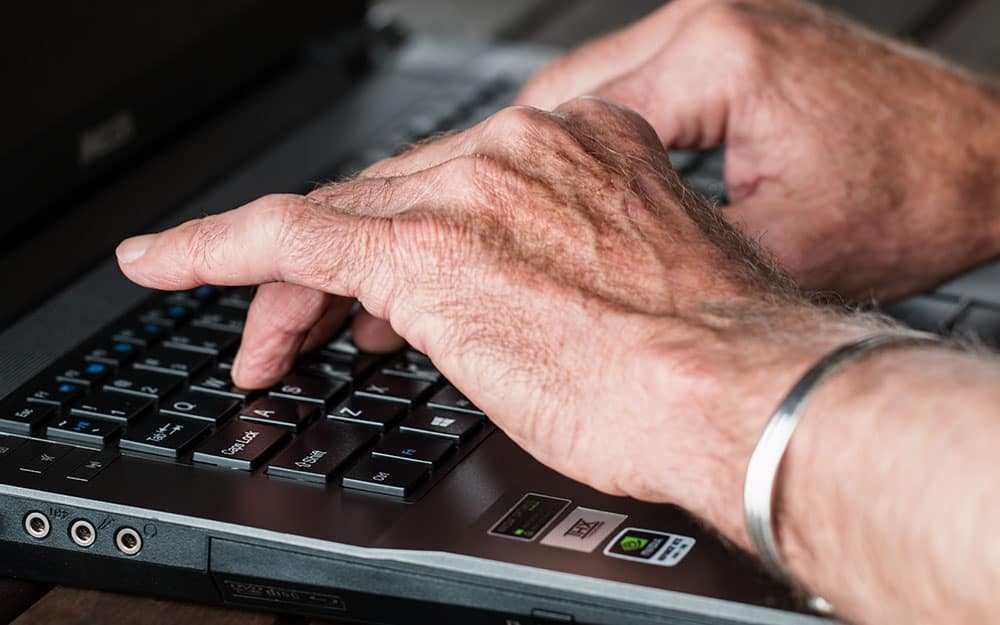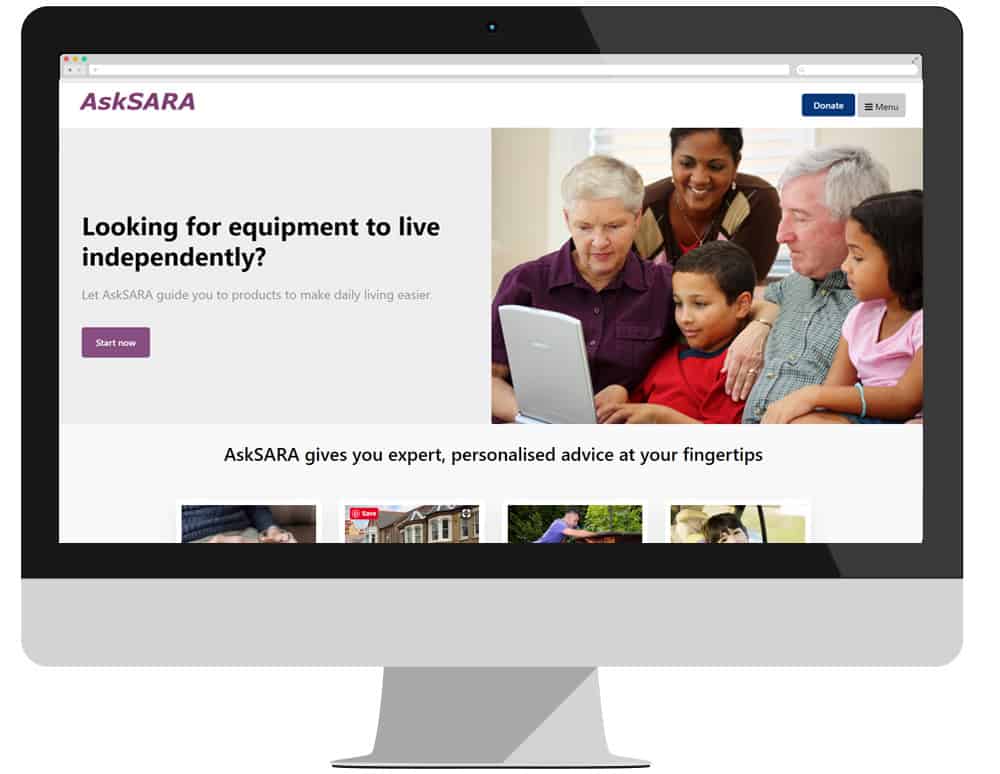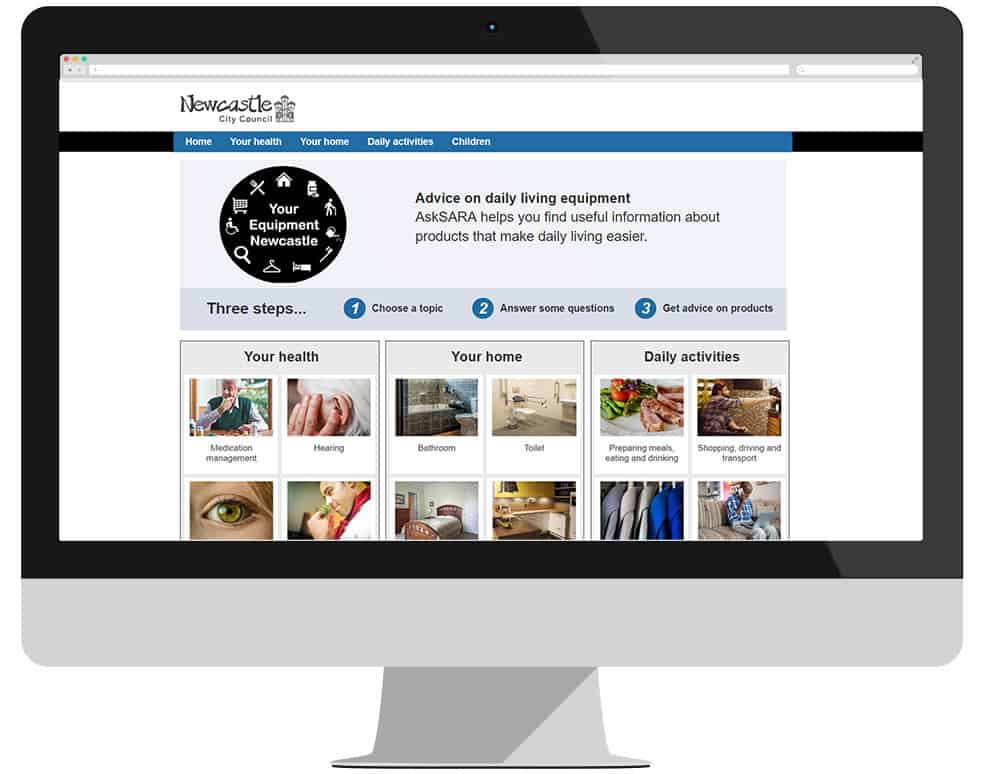DLF data analysis reveals crucial insights into who is searching for mobility equipment and why

The Disabled Living Foundation (DLF) has analysed data from its popular digital self-assessment tool AskSARA and revealed useful information to mobility retailers and suppliers regarding who is interacting with the application and what independent living products are commonly being recommended.
Providing clear, practical advice and information on products and suppliers of daily living equipment to end-users and healthcare professionals, the DLF operates a number of services providing impartial advice and training on equipment for daily living, with the national charity aiming to reach five million people by 2022.
With a database featuring over 10,000 products from 950+ national suppliers, as well as a list of 800 local retailers, the DLF offers a range of services primarily online, including its subscription-based DLF Data, Living Made Easy comparison site, as well as its assessment tool AskSARA.
What is AskSARA?

Originally supported by the Department of Health in 2009, the DLF’s AskSARA online guided advice application provides ‘self-assessment, rapid access’ (SARA) to help direct older and disabled people to impartial advice about suitable products to help with activities of daily life.
Anonymous, free to use and regulated by The Information Standard, users of AskSARA answer a series of questions which result in appropriate advice being provided that has been devised and revised by occupational therapists.
Available nationally through the DLF, as well as licensed by around 30 local authorities who tailor the tool with local signposting and advice relevant to the area, AskSARA aims to reduce the strain on assessment services which are being stretched.
According to the DLF, councils report that when the tool is offered as a ‘front door’ service, it can help residents quickly find low-level solutions for themselves that they are often happy to self-fund. In addition, this allows those with more complex needs to access formal assessments.

The DLF also points out that AskSARA’s user analytics also provide useful pointers for future service development, shining a light on what products and services users are commonly searching for.
The data analysis: who’s using AskSARA, and why?
The analysis is drawn from over 100,000 reports produced by users of AskSARA over a three-year period says the DLF, with surveys revealing that over 45 percent of users are searching on behalf of someone else.
Profiling data taken from Google Analytics provides the following profile of users for the year 2018:
- Female – 65%
- Over 65s – 20%
- Over 55s – 40%
- From England – 92%
- New users – 88%
So far, users have tended to be older women from England and the vast majority are using it for the first time. They select a topic, answer some OT-authored questions about their needs and the combination of answers they provide produces a tailored advice-based report which highlights the types of products they might find useful.
If the user then clicks on the product links, they’re taken to the product and supplier pages in Living Made Easy. If the user’s answers suggest areas of greater complexity, they are given clear advice to seek a more formal professional consultation.
Most common independent living topic
DLF’s analysis examined which topics were most commonly accessed. With over 90 topics to choose from, many were grouped together in order to identify trends more clearly.
A primary finding was that usage was widespread, with the top five grouped categories accounting for 35 percent of reports – which themselves include 44 separate topics.
Strikingly, the most popular topics cover the essentials of daily living, underlining the importance of products being easily and quickly available to fulfil those needs before they escalate due to accident or neglect.
Top 10 topic areas, as chosen by users of AskSARA (Source: DLF)
| Rank | Topics | 2015-16 | 2016-17 | 2017-18 |
|---|---|---|---|---|
| 1 | Bathing, Bathroom, Bathroom safety & Showering, Taking a bath, Using a shower, Washing and bathing, Basin |
3400 | 2686 | 3476 |
| 2 | Drinking, Eating, Eating and drinking, Preparing drinks, Preparing food, Preparing meals and drinks, Opening jars, tins, packages or bottles | 2439 | 2203 | 2342 |
| 3 | Bedroom, Bedroom furnishings, Bedroom location, Beds, Getting into bed, Getting ready for bed, Getting up at night, Getting up in the morning, Sleeping, Whilst in bed | 2424 | 1932 | 2253 |
| 4 | Toilet, Toileting, Going to the toilet, Getting to the toilet, Sitting and standing from the toilet, Using the toilet |
1786 | 1457 | 1973 |
| 5 | Alarms sensors and doorbells, Doorbells, Alarm clocks and smoke alarms, Meters, Telecare and gas detectors, Telecare and smoke alarms, Telecare and temperature extreme alarms, Safety concerns and complaints, Security, Personal safety, Help in emergencies, Living alone |
1971 | 1824 | 1680 |
| 6 | Stairlifts and through-floor lifts, Steps and stairs, Your stairs | 1575 | 1516 | 1583 |
| 7 | Medication management, Taking medication, Medical conditions | 1686 | 1388 | 1482 |
| 8 | Dressing, Clothing and footwear, Getting dressed and ready, Washing and dressing | 1561 | 1291 | 1394 |
| 9 | Chairs, Seating, Sitting and standing, Mobility | 1139 | 1147 | 1104 |
| 10 | Kitchen, Kitchen appliances, Kitchen cupboards, Kitchen lighting, Kitchen worktops and drawers, Safety in the kitchen | 986 | 846 | 999 |
As innovations and awareness of the value of telecare increase, the DLF says it is likely it will see more people accessing advice about those areas. Currently, the usage of the tool centres on early generation solutions with ‘help in emergencies’ dominating attention within the category.
As the list progresses further, DLF notes it starts to see lifestyle-orientated desires appearing, acknowledging people’s desire to maintain their leisure activities.
The full list of topics is extensive and shows a range of practical concerns – a powerful reminder of the wide-ranging effects of ageing.
For further information, including access to all the findings from this analysis, contact DLF at marketing@dlf.org.uk or 0207 289 6111.
Future developments
Further development of the AskSARA platform is planned in 2019 confirmed the charity, with new features including moving to ‘mobile-first’ design, recognising the growing importance of access from mobile devices.
DLF emphasises it will also take a fresh approach to the presentation of user reports and introduce new topics – including dementia-related equipment solutions.
https://thiis.co.uk/dlf-data-analysis-reveals-crucial-insights-into-who-is-searching-for-mobility-equipment-and-why/https://thiis.co.uk/wp-content/uploads/2019/05/ASKSARAH-DLF-national.jpghttps://thiis.co.uk/wp-content/uploads/2019/05/ASKSARAH-DLF-national-150x150.jpgNewsroomReports & ResearchThird Sectordaily living aids,Data Analysis,Disbaled Living Foundation,DLF,independent living,local authorities,mobility equipment,mobility retailers,mobility suppliers,occuaptional therapist,OT,researchThe Disabled Living Foundation (DLF) has analysed data from its popular digital self-assessment tool AskSARA and revealed useful information to mobility retailers and suppliers regarding who is interacting with the application and what independent living products are commonly being recommended. Providing clear, practical advice and information on products and suppliers...Calvin BarnettCalvin Barnettcalvin.barnett@bhta.comAuthorTHIIS Magazine

